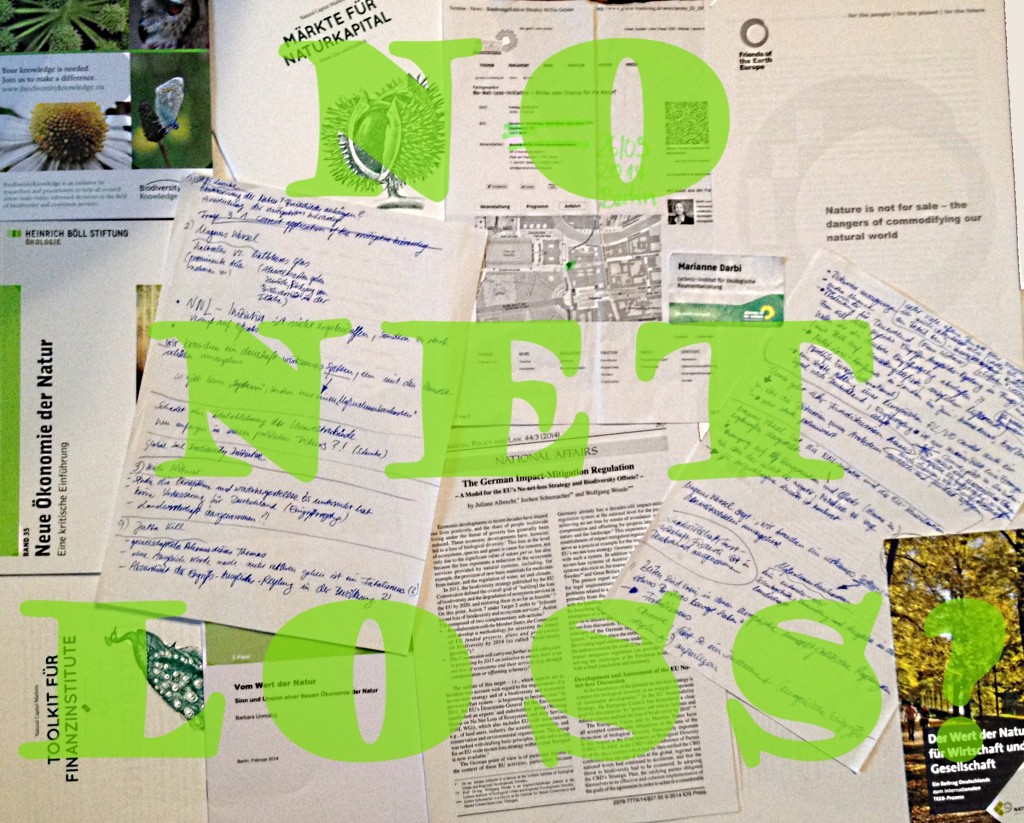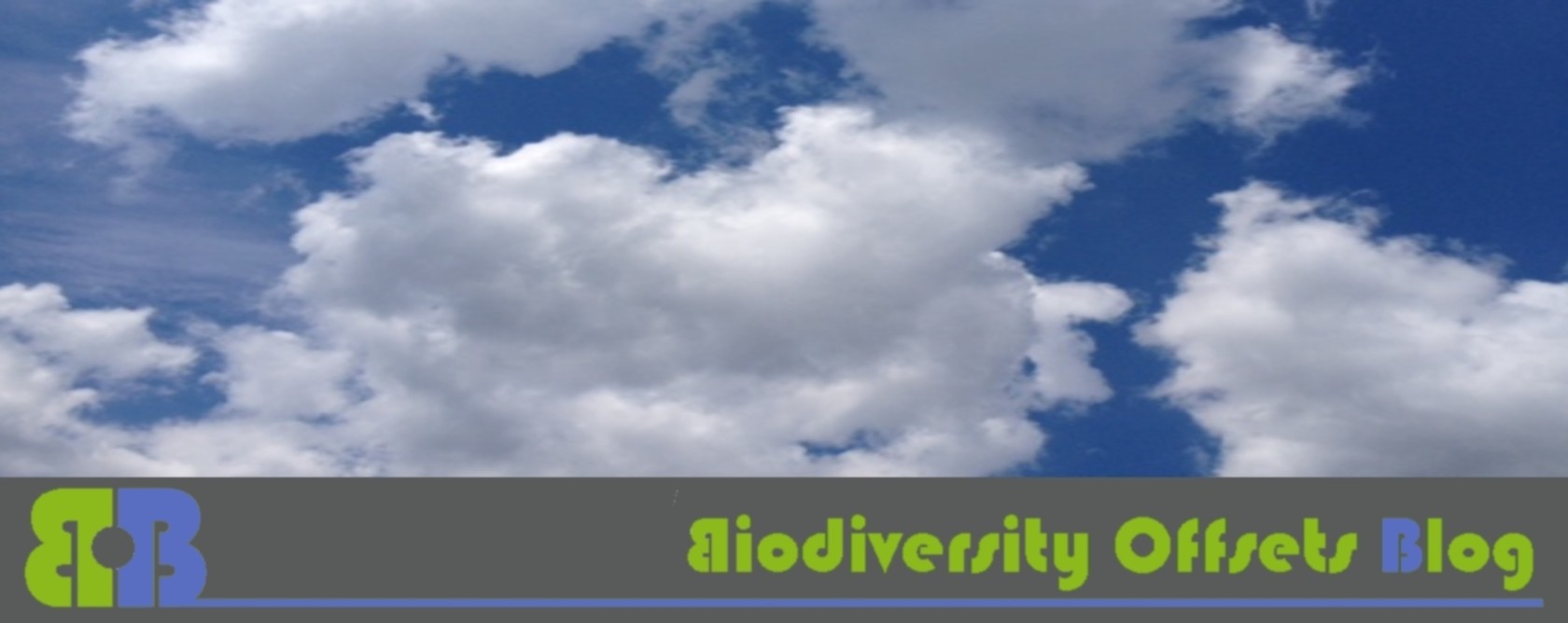 Last Friday I have been to a political session organized by the German Green party (Die Grünen) of the Federal Parliament (Bundestag) in Berlin. Steffi Lemke, parliamentary executive and speaker for nature conservation policies for the Green party, invited experts and the interested public to discuss the current discussion and development of the EU towards a No Net Loss Initiative (see my previous post here).
Last Friday I have been to a political session organized by the German Green party (Die Grünen) of the Federal Parliament (Bundestag) in Berlin. Steffi Lemke, parliamentary executive and speaker for nature conservation policies for the Green party, invited experts and the interested public to discuss the current discussion and development of the EU towards a No Net Loss Initiative (see my previous post here).
Introduction to the session
The relatively small audience of around 25 participants included representatives from nature conservation organizations, such as BUND (Bund für Umwelt– und Naturschutz Deutschland), DUH (Deutsche Umwelthilfe) and WWF (Worldwide Fund for Nature), but also from the Federal Ministry for the environment, the Federal Association of German landscape architects and some researchers.
After a short welcome note the host, Steffi Lemke, gave an introduction to the aims of the three-hour long event: What is the planned No Net Loss Initiative of the European Union all about? What is the current state of development and discussion? What are the risks and chances? Will this mean an economization of the environment and to put a price tag on nature? And what about the application of the mitigation hierarchy?
Presentations by three invited speakers
Following, three invited speakers gave 20 minutes of presentation followed by a short question and answer session each.
Magnus Wessel, head of nature conservation policy at the BUND spoke about the state of discussion of the EU No Net Loss Initiative. He started with the image of a half-empty vs. half-full glass: On the one hand w witness that threatened and prominent species such as the wolf have been increased in numbers. On the other hand “profane” species and biodiversity as a whole is being lost. Already the 2010 goal of the EU to halt biodiversity loss hasn’t been reached. On this background, the idea of offsetting – also seen the parallels to the German Impact Mitigation Regulation — is tempting. However, he argued that the current consultation of the EU on the planned No Net Loss Initiative too narrowly focuses on offsetting and thus loses the broad scope of instruments and approaches that “No Net Loss” would have initially included. Furthermore, he feared a new regulation of the EU on offsetting would only be possible in a political give-and-take that would ultimately weaken existing regulation, in particular the Birds and Habitats Directive. Instead, he concluded, we need a permanently effective system to deal with the negative impairments of the environment.
Dr. Heidi Wittmer, deputy head of the department for environmental policy at the Helmholtz Centre for Environmental Research (UFZ) held a presentation entitled “No Net Loss: Chances for biodiversity and financing”. She pointed to a study that compared several hundreds of ecosystems and restored ecosystems, stating that restored ecosystems can hardly ever match existing ecosystems and restoration per se is a very difficult task. While she cautiously mentioned that offsetting as such can have advantages and deliver a positive outcome for nature she concluded that both offsetting practice (including the experiences from the German Impact Mitigation Regulation) and the current discussion about the introduction of a EU no net loss policy (by which is meant biodiversity offsetting) have flaws. She also raised the question what this would mean for the situation in Germany and its Impact Mitigation Regulation (Eingriffsregelung) and anticipated that it most likely can’t go beyond the existing national provisions.
Jutta Kill, political activist against biodiversity offsetting, continued in the same line. In her presentation on the risks of the No Net Loss Initiative for nature conservation she questioned any impact mitigation regulation as such and gave examples for lacking or distorted implementation of the Eingriffsregelung. As a result in some cases it was even perceived as absurd by the local population. She continued her line of argumentation that offsetting risks to replace stakeholder participation and consideration of local community interests. Thus, she highlighted the relevance of the discussion as a broad societal concern that goes beyond technical or expert dialogs. She also led to a discussion of the value of nature (de dicto vs. de re, i.e. the unique value of an ecosystem vs. the value of its functions). Furthermore, she claimed that the current debate on a No Net Loss Initiative and biodiversity offsets would try to tackle the problem of biodiversity loss from the wrong starting point and thus even hinder to cope with “real solutions”. This refers in particular to the necessity to reduce the still increasing land use and to avoid negative impairments.
See the presentation here (in German): Jutta Kill_Fachgespräch Sept2014 No Net Loss Initiative
Discussion on risks and chances of biodiversity Offsets and the planned No Net Loss Initiative and my personal obsevation
Starting the discussion, Steffi Lemke contested that the three presentations painted a rather unbalanced picture that focused more on the risks and hardly mentioned any chances. She therefore encouraged to consider also the possible chances of a No Net Loss Initiative. Unfortunately the discussion didn’t add very much to this situation as the audience rather unanimously positioned themselves against biodiversity offsets and had already fixed firmly their disapproval of the No Net Loss Initiative, with a few exceptions.
Naturally, this is not a good prerequisite for a lively and controversial discussion and the whole event stayed way behind its aim to consider chances and risks, which was basically due to an unbalanced choice of speakers. I personally felt forced to strongly express a pro offsetting plea to at least try to counterbalance the overweight of negative arguments (even though I actually don’t want to take a biased one side position).
However, despite some good and insightful thoughts being expressed by a few participants, the discussion and the session as such didn’t manage to bring “fresh wind” into the no net loss debate and I departed disappointed about the seemingly already fixed mindset towards this issue.
Steffi Lemke closed the session expressing the need to bring the discussion more into the public and national politic discussion in the upcoming weeks and months. She also concluded that it is no option to simply reject the planned No Net Loss Initiative, but instead to impose strong prospects and to actively shape it to overcome the perceived deficiencies.
As I have pointed out, the line of argumentation in the presentations and the discussion was biased, so that a detailed description of the mentioned pros and cons wouldn’t add much to the (more elaborated) current state of discussion) and thus don’t make much sense.
For further information and background see also the official invitation and program.

Pingback: Biodiversity Offsets Newsweek, September 22-28, 2014 - Biodiversity Offsets Blog